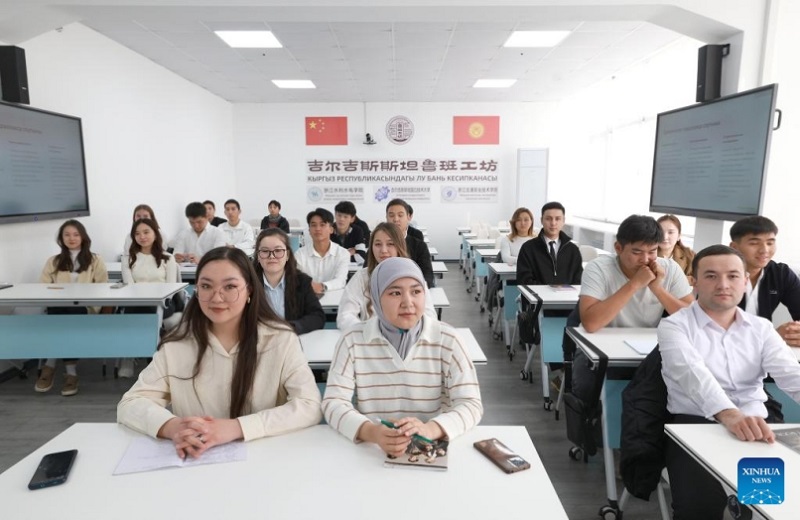
Students in a smart classroom of the Luban Workshop in Bishkek, Kyrgyzstan, on October 26, 2024. (Photo by Roman Gainanov/Xinhua)
Named after Lu Ban, the ancient Chinese master craftsman symbolizing excellence and ingenuity, the Luban Workshop represents a China-sponsored vocational education initiative designed to provide technical training in various fields to students and local instructors in partner countries. This program showcases China’s commitment to sharing expertise and solutions for industrial development and talent cultivation worldwide.
Since the inauguration of the first Luban Workshop in 2016, China has established 34 such centers in 30 countries across Asia, Africa, and Europe. These workshops are strategically aligned with key multilateral frameworks such as the Shanghai Cooperation Organization (SCO) and the Association of Southeast Asian Nations (ASEAN). Tianjin, a major port city and vocational education hub in northern China, has played a leading role in the initiative, having set up 10 Luban Workshops across eight SCO member countries.
Muhammad Mohsin Mujahid Qudoos from Pakistan, who is studying electrical automation at the Luban Workshop in Tianjin Modern Vocational Technology College, shared his experience, “I am always eager and passionate about studying technology. After coming to the Luban Workshop, I have learned new skills and experienced Chinese culture. China has advanced technology and [is] moving faster than I knew. I would like to learn more.”
Qudoos added that interactive discussions with instructors and hands-on experience with advanced lab equipment have been instrumental in shaping his career aspirations. “After graduation from Luban Workshop, I will go back to my country and bring back the skills and experiences I’ve learned here, so as to make innovation in industries and boost my country,” he said.
Nitinun Chomchuen, a Thai teacher of the Luban Workshop in Tianjin Bohai Vocational Technical College, emphasized the tangible benefits of the initiative for Thailand. She explained that students spend two years in China and one year in Thailand studying mechatronics, the Internet of Things, new energy vehicles, machine manufacturing, and automation. “Even before graduation, many Chinese-funded enterprises in Thailand come to recruit students. Graduates often receive higher salaries and experience faster career progression,” she said.
Beyond technical training, many students and teachers have also embraced Chinese language and culture. “This exposure encourages them to share their positive experiences with family and friends, strengthening mutual understanding and friendship between our two countries,” Chomchuen said.
To date, the Luban Workshop initiative has facilitated the joint development of nearly 100 majors across 16 disciplines, along with over 400 internationalized courses in Chinese and foreign colleges. More than 10,700 sets of specialized training equipment have also been deployed. In addition, the program has trained over 7,000 instructors and enrolled 33,800 students in academic programs, while providing skills training to more than 120,000 individuals.
Through these efforts, the Luban Workshop continues to serve as a bridge for educational and cultural exchange, supporting global talent development and international cooperation.